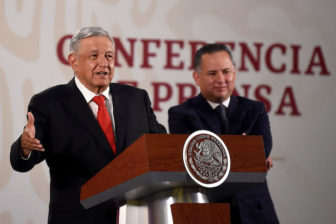A court in Guatemala opened proceedings on March 1 against five retired senior military officers charged with crimes against humanity committed three decades ago under the country’s former military regime. The five are accused of the illegal detention, torture and rape of a young student activist, Emma Molina Theissen, in 1981, and the forced disappearance of her 14-year-old brother.
The Molina Theissen family has awaited justice for decades. But the trial would likely not be happening at all without the transformation of Guatemala’s justice system that has taken place over the past few years, guided by the unique, UN-backed International Commission against Impunity in Guatemala, widely known by its Spanish acronym, CICIG.
Those hard-won gains are now under attack. As UN Ambassador Nikki Haley’s visit to the country this week suggests, Washington has a vital role to play in making sure Guatemala’s progress is not lost.
The Molina Theissen trial is the latest prosecution supported by CICIG to focus on crimes committed by the military during Guatemala’s long years of conflict. Past cases included those against former dictator Efraín Ríos Montt and other powerful actors long considered untouchable. One of them, Benedicto Lucas García, is the brother of an ex-military dictator. Another, Manuel Callejas y Callejas, was a director of intelligence.
But their case has drawn international interest for other reasons. Callejas y Callejas is widely reported to be the leader of a contemporary organized crime syndicate. At the end of Guatemala’s conflict in 1996, organized crime groups rooted largely in right-wing paramilitaries consolidated their control of important state agencies and functions. As a result, Guatemala became increasingly attractive to those engaged in drug and human trafficking, extortion schemes, and all manner of organized crime. Many people fled to the United States.
In Washington, both immigration hard-liners and those more concerned with human rights have found common cause in ending organized crime’s grip on Guatemala. CICIG has thus earned strong bipartisan support. Together with a reformist attorney general’s office, CICIG has unraveled major corruption schemes leading to the arrest of past presidents and other high officials. Guatemala’s current president, Jimmy Morales, along with several family members and political associates, is also under investigation for corruption. Other key backers of Morales from the old military order, including Lucas García, face charges for wartime crimes through the Molina Theissen trial and other cases.
The backlash against CICIG has been predictably fierce. Morales has sought to drive out the Colombian prosecutor who heads CICIG, Iván Velásquez. (Velásquez will participate in AS/COA’s March 2 anti-corruption conference in New York.) Velásquez is the most popular public figure in Guatemala, where a youth movement and new generation of business leaders are fed up with corruption. For now, strong domestic and international support, including from the U.S., have helped him keep his position.
CICIG has been so successful in part because it has had willing partners in the former and current attorneys general, and the new generation of independent-minded, professional prosecutors they have nurtured. The corrupt old guard is now making a back door attempt to defang it.
In mid-May, Morales will select a new attorney general. A nomination commission has been installed to ensure a transparent, merit-based selection process. But Morales’ political allies have stacked the commission with opponents of CICIG and reform. In recent weeks, the commission has adopted rules that will allow it to make arbitrary decisions, with no requirement to explain them.
Between the Molina Theissen trial, attacks on CICIG, and the attorney general selection, the coming weeks could determine whether Guatemala continues the process of reform, or the corrupt old guard stages a comeback. Also at stake is the ability of Guatemala to provide justice to the Molina Theissen family and others.
Haley reaffirmed the U.S.’ support for both CICIG and Velásquez during her trip to the region this week. That support is welcome – with so much at stake, it is vital that Washington remains closely engaged. Some financial aid, as well as Guatemalan officials’ ability to enter the U.S., should be conditioned on continued support for reform. One hopes that Haley made crystal clear that moves to weaken CICIG, or the selection of an old-guard crony as the next attorney general, would have serious consequences.
—
Witte manages the National Trials for Grave Crimes project at the Open Society Justice Initiative, which monitors grave crimes trials in Guatemala at www.ijmonitor.org.






